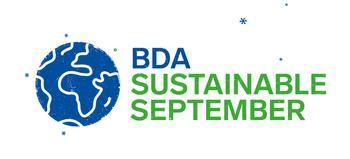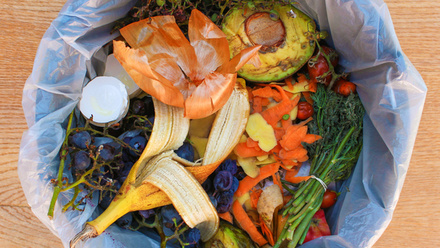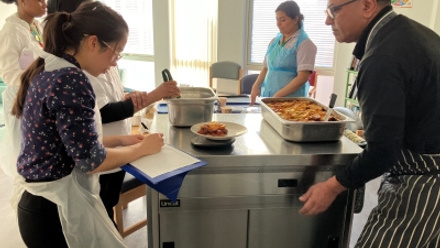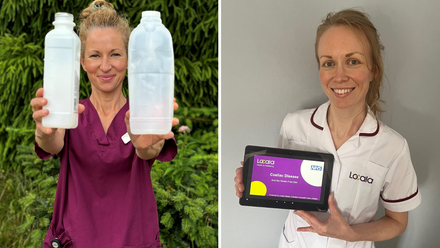
Government and public health professionals acknowledge the impact that can be achieved via standards which ensure public procurement of food meets key health goals. Leaders on environmental sustainability and nutrition, including the BDA’s One Blue Dot, are calling for this work to also include considerations for the planet.
Part One of the much-anticipated National Food Strategy, led by Henry Dimbleby, recommends more children have access to free school meals and holiday clubs, but has not yet set higher standards across settings. However, dietitians need to be prepared for what may be required as Part Two, to be published in 2021, is likely to be more specific and will have a larger focus on health and sustainability. Teaching children about healthy and sustainable eating, including where their food comes from, can help create healthier eating habits for life, but we know that eating behaviours are notoriously difficult to change. For children, climate change and their individual impact can seem an overwhelming topic, but thinking of the alternative can fire the imaginations of young people.
What’s happening now?
The awareness of sustainability of food in schools has significantly increased in the last few years, with many now recognising their need to do something about it. However, schools currently have little in the way of direction from central or local government with no regulations around meeting any specific requirements. The majority of the school food standards in the UK have little or no mention of sustainability.
- England School Food Standards 2014, have no specific mention of sustainability and no restrictions regarding where ingredients can be purchased from.
- Welsh Healthy Eating in Schools 2013 does not mention sustainability.
- NI National Standards for School Lunches 2007, is currently being updated however new guidelines do not appear to mention sustainability.
- Scottish Regulations for Nutritional Requirements for Food and Drink in Schools 2019 is the most recently updated and does mention the use of fresh, local and sustainable produce, but as an encouragement rather than requirement.
There are, however, voluntary schemes around food sustainability that schools can sign up to, such as the Soil Association Food for Life Served Here Award which certifies caterers on areas such as meals cooked from scratch, using sustainable fish, and use of local and seasonal produce.
One Blue Dot toolkit
The One Blue Dot toolkit produced by the BDA provides a detailed reference guide for dietitians on how the environmental science maps to nutritional considerations. The toolkit is applicable to the general population and for children over two years of age. It can be used by catering dietitians when designing and planning a sustainable menu. Some of the key recommendations from One Blue Dot and its applicability to schools include:
- Reducing red meat: This would be achievable in schools, with protein intakes across the population being above the recommended requirements, with younger age groups having almost double the recommended requirements (NDNS). Red meat is, however, a good source of iron, but studies have shown children following vegetarian diets is not associated with lower average total iron intake than omnivores (SACN 2011). Teenage girls, however, do consume sub-optimal amounts so focusing on plant-based foods high in iron would be beneficial for this group.
- Aiming for fish twice a week, one being oily: This is likely to be a challenge in schools. Acceptability of fish is low amongst children, particularly oily fish. Schools often therefore avoid/limit its use to avoid food waste. Using taste sessions and feedback from students and experimenting with different dishes could help increase uptake.
- Increasing plant-based proteins: This would be beneficial for children but needs to be done in a way to manage acceptability from those not used to eating them, for example adding them to familiar dishes, such as a bolognaise made with lentils and meat. Also being innovative with dishes made from plant-based proteins, examples such as tempeh ‘fish’ and chips, seitan Keema curry and miso ginger tofu poke bowl.
- Using more plant-based drinks and alternatives: The significant increase in cost compared to dairy milk could be a barrier to this recommendation in schools. However, nutritional implications would only be an issue if all dairy is completely excluded from the diet including at home. Schools could offer some plantbased alternatives such as soya yoghurt which would help normalise and encourage children to try them.
- Switching to wholegrains: This would help towards meeting fibre recommendations, which is low (and been decreasing in recent years) in children (NDNS). This would need to be managed to ensure taste/acceptability in children not used to eating wholegrains.
- Increasing fruit and vegetables: With the NDNS showing children only manage three portions a day, innovative ways should be considered to support the increase of fruit and veg at schools, with the emphasis on using seasonal produce.
Let’s Get Cooking has a national network of school clubs who can deliver healthy eating and sustainability sessions to children. They are regularly commissioned by local authorities and other partners for this work and can increase capacity for dietitians working in catering roles to support schools.
Case study: allmanhall
Specialist school food procurement company allmanhall enables the best food, the best cost savings and the best support – including nutrition and dietetic advice. These experts work closely with suppliers to ensure ethical standards are met. Seasonal fruit and vegetables are promoted to clients and support is provided to enable them to use local suppliers (as well as local produce), sustainable fish and meat are recognised. The company also works with suppliers and schools to improve efficiencies, for example limiting the number of school drops and means to reduce and manage waste.
One area of support provided by allmanhall is help in achieving the ‘Food for Life Served Here’ award – a great way for a school to bring a focus and recognition to sustainable eating.
As part of its menu reviews, allmanhall also offers a sustainable menu-checking service, in which the school is awarded points for areas such as the frequency of red meat on the menu, use of seasonal fruit and veg, sustainable fish, meatfree days etc. Support is provided to implement the recommendations with a sustainable food stamp provided on the menus if achieved.
Food waste reduction is an important issue, supported by allmanhall. Clients are provided with an industry-leading catering control platform, which allows schools to record food waste and then assess if menus need to be redesigned or portion sizes changed. It also helps with stock management, which further reduces waste.
In an impactful example of reducing and raising awareness of food waste, one school allmanhall works with kept all the food waste for a whole week and piled it up in the dining room for the students to see. Needless to say, all were shocked!
It will be interesting to see the impact Covid-19 may have, if any, on reducing food waste. Many schools are changing their practices around school meals, such as stopping self-service/salad bars, having simplified menus, pre-ordering of meals. All this may lead to reduced food waste.
What dietitians can do
Dietitians have an important role to play in the facilitation of sustainable diets. The current UK diet does not have the right balance of food recommended for a healthy, sustainable diet. Dietitians are in a strong position to combine healthy eating messages and sustainable diet advice, and support individuals to take action.
Dietitians who work within school catering companies have a unique advantage to be able to influence the delivery of sustainable food on a large scale and to help influence future generations. With increasing awareness of food sustainability, many schools are now actively looking for support.
A catering dietitian can support schools to become more sustainable in many areas:
- Educating: Engaging and getting the students on board is a crucial first step to making any changes. Teaching children about healthy and sustainable eating, including where their food comes from, can help create healthier eating habits for life. Expelling any myths they may believe, for example that a sustainable diet means no meat or just eating a plate of beans and lentils, is also helpful.
- Menu planning: Supporting the school to design a more sustainable and agile menu, meeting nutritional standards/guidelines, whilst also being popular and appealing with the students, is a key role of the dietitian. Support can also be provided with the language used and layout, making sustainable and plant-based food choices more exciting, e.g. using themed menus, putting the most sustainable options first on the menu (usually it would be the meat-free option) and themed tuck shop weeks.
- Taste: Taste and/or taste perception is an essential element. A dietitian can facilitate tasting sessions, which can be done in conjunction with suppliers who can provide food/meal samples, to encourage acceptability and to increase exposure to different foods.
- Food waste: A dietitian can support schools with managing food waste by working closely with the catering team to consider ways the food is stored, prepared and served to minimise waste and ensuring regular feedback from students on which dishes are popular. Education for students is also key to get them on board with any waste reduction initiatives the school may implement.
- Sustainable group: Supporting the school with setting up a sustainable food group with students leading is a great way to involve students, get feedback and understand what issues are important to them.
- Sustainable food policy: Supporting schools with writing policies to ensure food sustainability is a whole-school approach, for example incorporating sustainable food into lesson plans.
- Meat free days: With red and processed meat having the single biggest environmental impact of any type of food, educating children around ways to reduce meat is important. Meat-free days done in exciting and innovative ways are popular with students.
In summary…
Dietitians have a key role to play in promoting food sustainability and supporting changes to achieve this. In the near future, we anticipate the provision of guidance and recommendations to support schools and encourage those who need it to make the required changes. Schools providing a sustainable menu will not only help the environment and the health of children, but in doing so will promote this way of eating, hopefully supporting the development of much needed sustainable habits for the future.
Acknowledgements: Dr Frankie Phillips, RD who commented on One Blue Dot and children’s diets
References
National Diet and Nutrition Survey Results from Years 7 and 8 (combined) of the Rolling Programme (2014/2015 to 2015/2016). Accessed online July 2020
SACN. Iron and Helaht Report – Gov.uk (internet) 2011. Accessed 17.07.2020.







